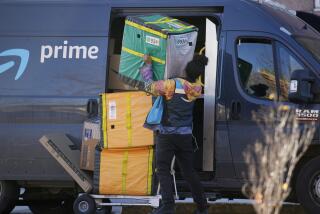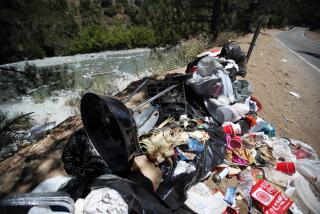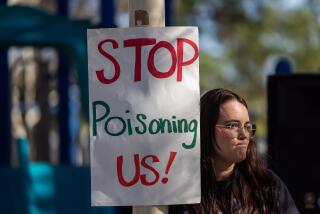The incredible plastic bag
In their Aug. 15 Blowback, L.A. County Supervisors Yvonne B. Burke and Zev Yaroslavsky argue that consumers should be charged a 25-cent tax for each plastic bag they use. The Times of London wrote in a March 8 editorial, “Many of those who have demonized plastic bags have enlisted scientific study to their cause. By exaggerating a grain of truth into a larger falsehood they spread misinformation, and abuse the trust of their unwitting audiences.”
Regrettably, the supervisors are doing precisely what The Times warned against -- spreading misinformation. Burke and Yaroslavsky assert that “about $375 million each year is spent in California on cleanups and other efforts to mitigate the environmental effect of disposable bags, costing each household about $200.” Nearly 37 million people live in California, and $375 million divided by 37 million is $10.14. Are we to assume that each household has 20 people? Burke and Yaroslavsky do not state how the $375-million figure is calculated, but it is apparently the entire California litter cleanup budget -- for everything. Why do they pin the entire state litter cleanup budget on plastic bags?
Plastic bags are a small percentage of total litter, so eliminating them won’t save taxpayers a penny because other litter will still need to be cleared from the same locations. Plastic bags do indeed fly off trash trucks, but whose fault is that? The Board of Supervisors should address this problem instead of placing the blame for it on law-abiding consumers and the plastic-bag industry.
Burke and Yaroslavsky talk about marine life and imported-oil used to make plastic bags. Are tens of thousands of marine mammals and seabirds killed each year by plastic bags? No. The Times exposed this as a myth based on a typographical error. The report on which the myth is based referred to discarded nets, not plastic bags. Are plastic bags made of imported oil? No -- 85% of the plastic bags used in the United States are made domestically. U.S.-manufactured plastic bags are made of ethane, which is a waste product extracted from domestically produced natural gas. If the ethane is not used to make plastic, it would need to be burned off. Plastic bags are a wonderful use of a waste product.
Plastic-bag recycling bins have been installed in all large California supermarkets and retail stores since 2007. Virtually all of the plastic in those bins is recycled. Moreover, plastic bags are reused for lining trash bins, pet waste disposal and more. Reuse is the best form of recycling because it consumes zero energy.
Ban or tax plastic, and people will switch to paper. According to a 2005 study, paper bags result in 3.3 times more greenhouse gases than plastic bags. Paper bags are many times heavier than plastic bags and require more fuel to transport.
Do plastic bags “clog up” landfills? No. According to the California Integrated Waste Management Board, plastic bags (including retail bags) take up a mere 0.4% of landfill space by weight. Plastic bags do not decompose in landfills, which is presented as a negative. In fact, it is a blessing. Decomposing paper in landfills produces methane, which is a potent greenhouse gas.
Burke and Yaroslavsky criticize plastic-bag manufacturers for trying to “protect their profits.” There’s no shame in that; this is not the old Soviet Union.
More than 4,000 people are employed in this country (including L.A. County) making plastic bags. The supervisors say, “Think about protecting marine life.” I say think about protecting human life. Destroying an American manufacturing industry and 4,000 jobs is not a decision to be taken lightly and should never be based on misleading information.
I am puzzled by the Board of Supervisors’ over-the-top obsession with plastic bags. Members of the county’s staff have spent thousands of hours on this matter. This petty obsession is beginning to define the board. Doesn’t Los Angeles have more pressing matters?
Stephen Joseph is counsel for SaveThePlasticBag.com -- a group that advocates for plastic manufacturers -- which has sued Los Angeles County regarding its phased ban of plastic bags.
More to Read
A cure for the common opinion
Get thought-provoking perspectives with our weekly newsletter.
You may occasionally receive promotional content from the Los Angeles Times.






